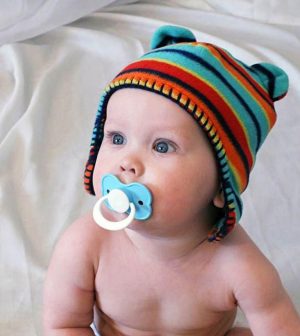- Recognizing the Signs of Hypothyroidism
- 10 Strategies to Overcome Insomnia
- Could Artificial Sweeteners Be Aging the Brain Faster?
- Techniques for Soothing Your Nervous System
- Does the Water in Your House Smell Funny? Here’s Why
- Can a Daily Dose of Apple Cider Vinegar Actually Aid Weight Loss?
- 6 Health Beverages That Can Actually Spike Your Blood Sugar
- Treatment Options for Social Anxiety Disorder
- Understanding the Connection Between Anxiety and Depression
- How Daily Prunes Can Influence Cholesterol and Inflammation
Babies Produce Strong Immune Response to Ward Off COVID-19: Study

British researchers report that babies have a strong immune response to the virus that causes COVID-19, based on a new, small study.
For the research, the investigators assessed the immune systems of four infants under 3 months of age who had recovered from COVID, and compared them with adults who also had recovered from the disease.
Compared to adults, the babies produced relatively high levels of antibodies and immune cells that can specifically protect against the SARS-CoV-2 virus.
That could be why babies seem able to ward off COVID-19 at a time of life when they might be expected to be more vulnerable, according to the authors.
“By conducting a detailed study on young infants who are relatively protected from severe COVID-19, we have shown what protective immunity ‘looks like’ in terms of the make-up of specific antibodies and immune cells directed against SARS-CoV-2,” said study author Dr. Anu Goenka, a clinical lecturer at the University of Bristol and Bristol Royal Hospital for Children.
“This is very useful information for the design of future COVID-19 vaccines that could seek to induce and mimic the signature of this protective immunity,” he said in a university news release.
The findings were recently published in the journal Cell Reports Medicine.
Goenka and his team hope to confirm the findings in a larger group of infants, and also to compare infant and adult immune response during a COVID-19 infection and at several points after recovery.
During the pandemic, kids have been much less likely than adults to become seriously ill with COVID-19. That was unexpected, especially in young infants who are vulnerable to severe disease from other respiratory viruses, such as RSV (respiratory syncytial virus) and flu, the researchers noted.
They said little data has been published previously on young infants’ immune response to SARS-CoV-2.
More information
The Mayo Clinic has more on COVID-19 in babies and children.
SOURCE: University of Bristol, news release, June 11, 2021
Source: HealthDay
Copyright © 2026 HealthDay. All rights reserved.










